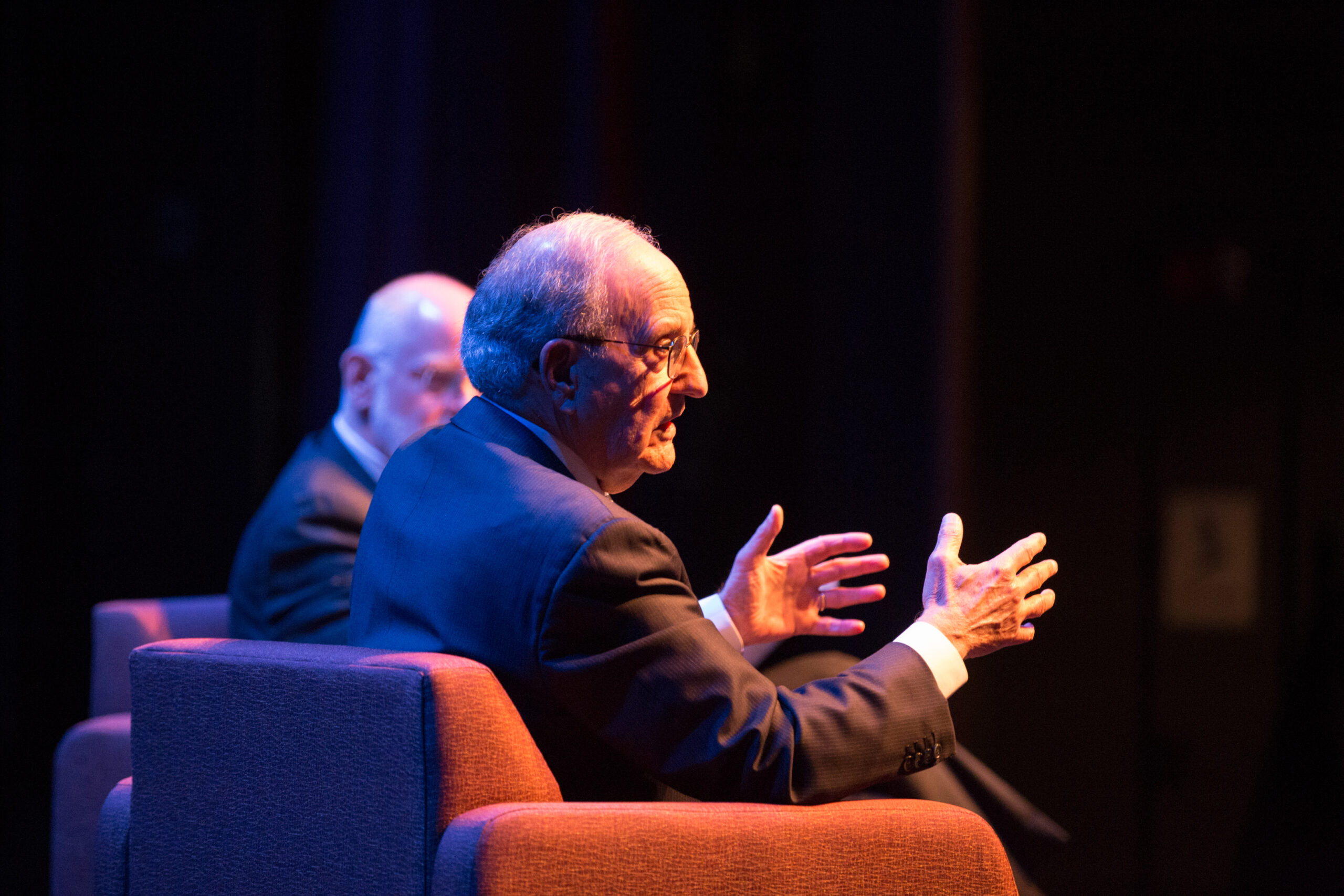Mitchell ’54 on life, Democratic party
December 8, 2017
Senator George Mitchell ’54, H’83 returned to campus early this week to participate in a dialogue with President Clayton Rose titled “Public Service in Times Like These,” during which he challenged his fellow Democrats to reexamine their governing priorities.
“There has been an inversion of priorities, and I think the political priority has taken precedence,” said Mitchell.
“We are Americans first, we have a national obligation to the people, to our democratic system … The notion that one individual, one group, one point of view can totally dominate our society to the exclusion of all other persons and interests is not only alien to our sense of what democracy means but to the best interests of the society as a whole.”
 Ann Basu
Ann Basu
Mitchell said the greatest challenge for the Democratic party going forward will be to address the growing wealth disparity in the U.S. He believes that devising policies to ensure that increasing wealth is not concentrated in an even smaller number of individuals will be the biggest challenge.
Mitchell cited the passage of the Americans with Disabilities Act, Medicare and the GI Bill as highlights of the Democratic record. He believes a return to the values of those decades should be prioritized.
“That’s the record that we brought to the challenges of the past and we have to bring it to the challenges of the future. We believe in a society in which no one should be guaranteed success but every single person should have a fair chance to succeed.”
Mitchell also spoke about his early life in Waterville, Maine growing up in very poor family. His mother was an immigrant from Lebanon who could neither read nor write upon her arrival in the United States.
She worked long, often overnight shifts at a textile mill while Mitchell’s father, with only a third-grade education, worked at Central Maine Power. He lost his job soon before Mitchell headed to Bowdoin, and later worked as a janitor at Colby College.
His father’s work supervisor, seeing promise in Mitchell, suggested he meet with his friend Bill Shaw, an admissions officer at Bowdoin, which was about an hour south of his hometown. After an interview was set up on on his behalf, Mitchell hitchhiked down to Bowdoin since his family did not own a car. He was accepted to the College that same day.
In an interview with the Orient, Mitchell spoke fondly of his time here.
“The chance to come here was for me so far beyond the scope of my idea of possibility at the time that it’s really not possible for me to describe how big a step up it was,” he said.
He drove trucks for Brunswick Oil and Coal nearly full-time in order to fund his education while completing his coursework.
“I always regard it as one of the most fortunate occasions of my life. So many people helped me and became role models and mentors—I formed a lifelong relationship with Dr. Helmreich who taught European history. But I always felt that the education I got here opened me up to other people, other places, other ideas, other ways of life and that I took the first step toward adulthood at Bowdoin.”
Over the years, Mitchell has stayed incredibly involved with the College, from donating his immense archives to Bowdoin, which now reside in the the George J. Mitchell Department of Special Collections and Archives, to supporting programs like Upward Bound, which works to help under-resourced high school students prepare for and attend college.
Mitchell took questions from the audience at the event, most of which were from students. Questions dealt with topics ranging from the impact of Brexit on Northern Ireland to educational opportunity in public schools.
Ben Ratner ’19, who took the opportunity to ask Mitchell a question at the event, found his visit to be far more valuable than that of recent speakers to campus.
“I was especially impressed with the way he gave substantive responses to student questions, and really seemed to want to engage. You don’t see that a lot with the types of speakers the College brings in—I’m thinking specifically of Arthur [C. Brooks] and Frank Bruni,” he said.
When Rose asked his opinion on the first year of Donald Trump’s presidency, Mitchell chose to speak about policy rather than personality. He denounced Trump’s stance on climate change and Trump’s remark encouraging the attainment of nuclear weapons by Japan, South Korea and Saudi Arabia.
“Were Japan, South Korea and Saudi Arabia to attain nuclear weapons as they can do, it will completely undermine the nuclear non-proliferation regime and lead to an instantaneous worldwide race for nuclear weapons,” he said.
In a time of great discontent with American government, Mitchell maintains great hope in the value of public service.
“Life is a never-ending search for respect—first, and most important, self-respect and then the respect of others. There are many ways to achieve it, and in most people there’s an innate drive to do well, to achieve what some call fame and fortune and recognition,” he told the Orient.
“But my life experience has taught me … the more one gets of things, the more one realizes that there has to be more to life than that and that real fulfillment will come not from recognition or acquisition but from working with all of your spiritual and physical might for a cause that is larger than your self-interest, that helps other people.”

Comments
Before submitting a comment, please review our comment policy. Some key points from the policy: